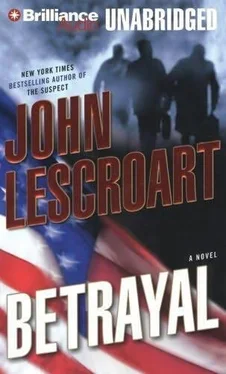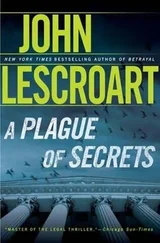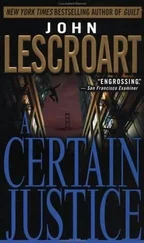John Lescroart - Betrayal
Здесь есть возможность читать онлайн «John Lescroart - Betrayal» весь текст электронной книги совершенно бесплатно (целиком полную версию без сокращений). В некоторых случаях можно слушать аудио, скачать через торрент в формате fb2 и присутствует краткое содержание. Жанр: Триллер, на английском языке. Описание произведения, (предисловие) а так же отзывы посетителей доступны на портале библиотеки ЛибКат.
- Название:Betrayal
- Автор:
- Жанр:
- Год:неизвестен
- ISBN:нет данных
- Рейтинг книги:5 / 5. Голосов: 1
-
Избранное:Добавить в избранное
- Отзывы:
-
Ваша оценка:
- 100
- 1
- 2
- 3
- 4
- 5
Betrayal: краткое содержание, описание и аннотация
Предлагаем к чтению аннотацию, описание, краткое содержание или предисловие (зависит от того, что написал сам автор книги «Betrayal»). Если вы не нашли необходимую информацию о книге — напишите в комментариях, мы постараемся отыскать её.
Betrayal — читать онлайн бесплатно полную книгу (весь текст) целиком
Ниже представлен текст книги, разбитый по страницам. Система сохранения места последней прочитанной страницы, позволяет с удобством читать онлайн бесплатно книгу «Betrayal», без необходимости каждый раз заново искать на чём Вы остановились. Поставьте закладку, и сможете в любой момент перейти на страницу, на которой закончили чтение.
Интервал:
Закладка:
"Bill," Glitsky said, "you're telling me both agents quit?"
"Yes, sir."
"At the same time?"
"I'm not at liberty to disclose that, Abe. They're no longer with the Bureau. That's all I know."
"Could I talk to their superior?"
"I am their superior, Abe. What else do you want to know?"
"I want to know where they are."
"I just told you. They quit."
"You just also told me that you were their superior. And two hours ago when we last talked, you didn't know they'd left the Bureau."
"I hadn't worked with them personally in a while, Abe. I guess they got away from me."
After a small pause, Glitsky tried again. "This is a murder case, Bill. Freed and Riggio testified a couple of years ago down in Redwood City and it would be helpful to know who they talked to."
"Wouldn't that all be in the record?"
"We were wondering if any of their reports dealing with that case happened not to get turned over to the DA."
"I'm sure they turned over everything they were supposed to. And you're investigating a homicide in Redwood City? Isn't that outside of your jurisdiction? And who is we?"
"The Redwood City case might be connected to a couple of San Francisco homicides, Bill. And we is me and the lawyer I've been working with on this stuff."
"Well, whoever it is, Freed and Riggio aren't going to be available."
"Because they've left the Bureau?"
"That's correct, Abe. Anything else?"
"When you say they left the Bureau, Bill, do you mean they joined another federal agency? Or are you telling me a couple of thirty-something FBI agents opened a Dairy Queen in Texas and didn't tell you where?"
"Always a pleasure to talk to you, Abe. Have a nice day."
In spite of Schuyler's best wishes, Glitsky wasn't, in fact, having a nice day. He sat at his desk in the early afternoon. He had gotten up five minutes earlier and turned off his overhead lights, closing and locking the door behind him. Both of his hands were cupped on the blotter in front of him and from time to time, irregularly, he would drum the fingers of those hands. His mouth was tight and a muscle in his jaw worked at the side of his cheek.
He hadn't been kidding when he'd told Hardy that one didn't really have bosom buddies among the agents of the Federal Bureau of Investigation. But Hardy's request, to put the word out to Agents Jacob Freed and Marcia Riggio to talk to him if he called, had been so benign that Glitsky never expected any sort of bureaucratic runaround. He and Schuyler had worked portions of several cases together and, jurisdictional squabbles apart, had always before gotten along reasonably well as human beings.
When Hardy had told him on Friday night that the number of questions surrounding the Bowens, which might or might not be connected with the Scholler case, was sufficient to get his attention, Glitsky still had had no problem reserving his judgment. Questions came with the territory. They were what investigations were all about. Few people had the good taste to disappear or die in such a way as to leave all questionable issues in their lives resolved.
But now this unexplained and almost certainly spurious disappearance of the two FBI agents who'd been instrumental in the Scholler case forced Glitsky up against one of the other cardinal rules of investigation: There is no such thing as a coincidence.
It wasn't a coincidence that Ron Nolan worked for Allstrong, and so had Arnold Zwick.
Three broken necks in one weekend wasn't a coincidence.
Beyond those new and disturbing items, it was one thing to have Charlie Bowen, who was working on the appeal in the Scholler case, vanish without a trace. There was a reasonable and plausible explanation for the suicide of his wife six months later.
And certainly FBI agents had been known to leave their jobs.
But for all of these things to come together in an apparently random set of coincidences stretched Glitsky's credulity far beyond its normal capacity for elasticity.
A relationship existed here among these parts. He just didn't know what it was. But he was starting to get a good idea that it probably involved at least one homicide in his jurisdiction, possibly two. And maybe more. This made it his business.
But more than that, the FBI and Allstrong connections significantly enlarged the playing field. Whatever had originally happened in the Scholler case, and Glitsky was woefully ignorant of all but the most general of those details, it had appeared more or less parochial-essentially two guys duking it out over a woman. Now, suddenly, Hardy's theories involving the Khalils, and whatever business they were doing in Iraq, and perhaps even some kind of U.S. government involvement, did not seem so incredibly far-fetched. And though Abe's opinion of the FBI's methods included his belief that it would ignore the taking of a life by a snitch or a prospective witness if it suited its agenda, it it did not extend to the possibility that its agents would actually sanction or commit murder.
So-the only conclusion he could draw-the FBI knew more about this case than they were willing to divulge. They possibly knew who had killed the Khalils. And who had killed Ron Nolan. And if it wasn't Evan Scholler, this meant that the FBI had let the wrong man be sent to prison for life.
If one of the Khalils instead had killed Nolan in retaliation, and then either or both of the Bowens because they'd picked up that trail, and the FBI knew about it…
He pulled over the phone on this desk, lifted the receiver, and punched in a number he knew by heart. "Hello, Phyllis," he said, "it's Abe Glitsky. I need to talk to Diz, please."
Hardy's private investigator, Wyatt Hunt, did his research primarily on his computer in the large converted warehouse by the Hall of Justice that he called home. He had no trouble finding the details of the Khalil murders on the net. Over the weekend, he also spoke to Hardy to clarify exactly what his assignment was. It had evolved somewhat from Friday's first phone call, when Hardy merely wanted to know who, if anyone, among the Khalil family had had an interview with FBI special agents in regard to the Scholler case. Now, Hunt's personal priority had shifted to finding out, without putting himself in danger, what those interviews had been about.
By now, on Monday afternoon, he knew that the extended Khalil clan consisted of twenty-three separate families strung out between South San Francisco and San Jose, and then across the Bay over to Hayward and Fremont. The typical arrangement was that each family owned its own franchise of the 7-Eleven chain, although four of them owned more than one store. The family had been in the country since Ibrahim and Shatha had emigrated with their four children in 1989, before the first Gulf War.
The eldest surviving brother, Abdel Khalil, had been the spokesman for the family in the aftermath of the murders of his parents and seemed the likeliest source of information. Abdel owned three stores along the El Camino Real between the two northern Peninsula towns of Millbrae and San Bruno, but conducted his corporate business out of a low-slung stucco-and-glass building set down in a former landfill by San Francisco Airport.
Hunt got out of his Mini Cooper and walked in the flat glaring sunshine across a treeless parking lot and into the nondescript reception area of AMK, Inc. A swarthy, somewhat disheveled young man in shirtsleeves sat at the only substantial piece of furniture, a cluttered desk in the middle of the room. He was sorting some kind of paperwork. A cup of tea steamed at the side of his desk. The screen saver on his computer showed an artist's rendering of a 7-Eleven store in a typical urban strip mall. A radio, turned low, played what Hunt would have called Middle Eastern, perhaps Iraqi, music.
Hunt had made the appointment this morning, probably with this same young man, under slightly bogus conditions, saying that he was a writer who was doing an article on successful immigration stories. Now, after he introduced himself, the boy gave him a nervous smile and disappeared through a door behind him, leaving Hunt standing alone in front of the desk.
Читать дальшеИнтервал:
Закладка:
Похожие книги на «Betrayal»
Представляем Вашему вниманию похожие книги на «Betrayal» списком для выбора. Мы отобрали схожую по названию и смыслу литературу в надежде предоставить читателям больше вариантов отыскать новые, интересные, ещё непрочитанные произведения.
Обсуждение, отзывы о книге «Betrayal» и просто собственные мнения читателей. Оставьте ваши комментарии, напишите, что Вы думаете о произведении, его смысле или главных героях. Укажите что конкретно понравилось, а что нет, и почему Вы так считаете.












